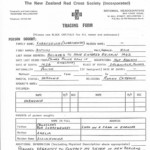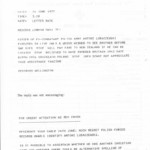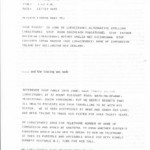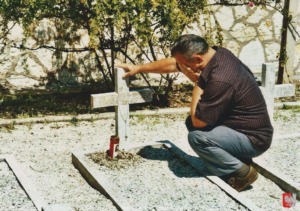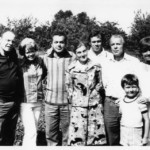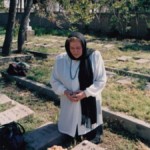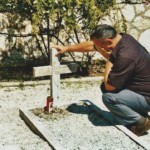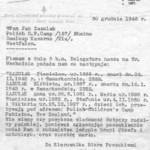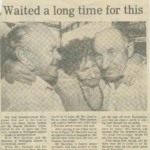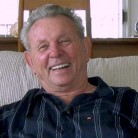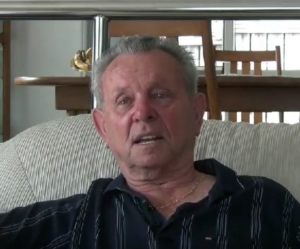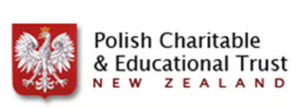Polish Refugees in New Zealand 1944-1951
Exhibitions
Finding Family in Later Years
Józef Jagiełło: Our son, Ross, was married in February of 1997, and Joy and I travelled down to Auckland to help with the preparations for the reception, being held at the brides’ parents’ home. We had a free day on the Friday before the wedding and so decided to spend the day looking around the Auckland Museum, as we hadn’t visited it for years. The Museum was featuring a special exhibition about wars involving New Zealand. Wandering around the exhibits we came into a large area, set up with tables loaded with books about the wars. Joy, being the bookworm, made a beeline for the books, and began sifting through them. She noticed a small red book that interested her, the title being, “Friends of England.” She picked it up, and to our amazement it fell open on the page where it gave the address to obtain information about Polish soldiers of the Polish Free Army who fought with England against the Germans during the Second World War. (p350)
… I opened the large letter; its’ contents were fantastic, much more than I’d ever hoped for. It contained my Dads’ Army Records, giving my parents’ birthplaces, birth dates and where they’d lived before the war, my father’s parents’ names, and the most amazing thing – it seemed that I might have had a sister, Helena. There was a long list of my Dads’ personal effects to be sent by the Department, along with a form to apply for his medals. … In the list of my Dads’ personal effects, yet to come, were twenty-four photographs, personal letters, a watch and chain, and various others mementos. (p351)
… There were also photographs of my parents, and for the first time in my life I knew what they looked like. They were small passport size photos, but even so, the family likeness was apparent, and I could see resemblances between my kids, and me and my Mum and Dad. There was also an informal wedding photograph of them, surrounded by family members, probably taken in Ochotnica Dolna, where I’d been born. There were numerous photos of Dad’s army mates, which of course, meant nothing to me, apart from giving me a look at how he had lived while in the army. There was a bundle of letters from friends and family to him, but included one that he’d written to me, that had never been posted. So, after fifty years, his words and thoughts to me were delivered at last. (p352)
… We decided to write to the Poles listed in the address book, asking them if they had any connection with my family. Lo, and behold, I got a letter back from the son of one of the people I’d written to. He explained that his parents were both now dead, but that the local Post Office had contacted him to say there was a letter from New Zealand addressed to his parents, and enquiring whether he would accept it. Of course he did, and told me that he was my cousin, related on my mother’s side, his mother being my mother’s half sister. He, his wife and most of his adult family were living in Szczecin, near the Polish/German border on the Baltic Sea. He seemed to be very pleased to have heard from me, as they had believed me dead, after hearing nothing about me for all these years. (p352)
Loreto boasts a magnificent monastery situated on the hill above the village, behind which is the cemetery dedicated to the Poles who fought and fell in the battle of Castelfidardo. (p355)
… We were surprised at how well the cemetery was looked after, with the Polish flag flying, and a memorial tablet dedicated to the fallen soldiers. The cemetery looked out over a beautiful green valley, full of olive trees; there were roses blooming in the gardens that surrounded the gravesites. Because of the sloping ground, the cemetery was set on three levels, and the cross marking each grave had a rosary draped over it and the name of the fallen soldier. We knew from Dads’ army records the plot number and row of his grave and we began looking for it. (p355-356)
… Carol found the cross of Franciszek Jagiello, and we all gathered around, in tears, at the grave, trying to comfort each other. We were all shocked and surprised at the enormity of the grief we experienced. This was my father buried here, and Johns’ grandfather, who had only been a name and photo before. It was reality, and jolted us all with the terrible sadness of our loss and his. … Then we walked back to the village to buy rosaries that we hung on the cross, so my Dad had gifts from his family after all this time. (p356)
One Man’s Odyssey; p350, 351, 352, 355-356, 356
Voices
Photos
Documents
